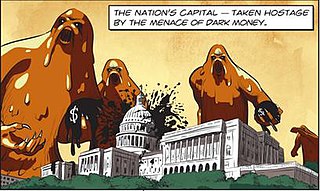Campaign finance laws in the United States have been a contentious political issue since the early days of the union. The most recent major federal law affecting campaign finance was the Bipartisan Campaign Reform Act (BCRA) of 2002, also known as "McCain-Feingold". Key provisions of the law prohibited unregulated contributions to national political parties and limited the use of corporate and union money to fund ads discussing political issues within 60 days of a general election or 30 days of a primary election; However, provisions of BCRA limiting corporate and union expenditures for issue advertising were overturned by the Supreme Court in Federal Election Commission v. Wisconsin Right to Life.
In the United States, a political action committee (PAC) is a 527 organization that pools campaign contributions from members and donates those funds to campaigns for or against candidates, ballot initiatives, or legislation. The legal term PAC was created in pursuit of campaign finance reform in the United States. Democracies of other countries use different terms for the units of campaign spending or spending on political competition. At the U.S. federal level, an organization becomes a PAC when it receives or spends more than $1,000 for the purpose of influencing a federal election, and registers with the Federal Election Commission (FEC), according to the Federal Election Campaign Act as amended by the Bipartisan Campaign Reform Act of 2002. At the state level, an organization becomes a PAC according to the state's election laws.

The Bipartisan Campaign Reform Act of 2002, commonly known as the McCain–Feingold Act or BCRA, is a United States federal law that amended the Federal Election Campaign Act of 1971, which regulates the financing of political campaigns. Its chief sponsors were senators Russ Feingold (D-WI) and John McCain (R-AZ). The law became effective on 6 November 2002, and the new legal limits became effective on January 1, 2003.
Buckley v. Valeo, 424 U.S. 1 (1976), was a landmark decision of the US Supreme Court on campaign finance. A majority of justices held that, as provided by section 608 of the Federal Election Campaign Act of 1971, limits on election expenditures are unconstitutional. In a per curiam opinion, they ruled that expenditure limits contravene the First Amendment provision on freedom of speech because a restriction on spending for political communication necessarily reduces the quantity of expression. It limited disclosure provisions and limited the Federal Election Commission's power. Justice Byron White dissented in part and wrote that Congress had legitimately recognized unlimited election spending "as a mortal danger against which effective preventive and curative steps must be taken".
A 527 organization or 527 group is a type of U.S. tax-exempt organization organized under Section 527 of the U.S. Internal Revenue Code. A 527 group is created primarily to influence the selection, nomination, election, appointment or defeat of candidates to federal, state or local public office.
The Federal Election Campaign Act of 1971 is the primary United States federal law regulating political campaign fundraising and spending. The law originally focused on creating limits for campaign spending on communication media, adding additional penalties to the criminal code for election law violations, and imposing disclosure requirements for federal political campaigns. The Act was signed into law by President Richard Nixon on February 7, 1972.
McConnell v. Federal Election Commission, 540 U.S. 93 (2003), is a case in which the United States Supreme Court upheld the constitutionality of most of the Bipartisan Campaign Reform Act (BCRA), often referred to as the McCain–Feingold Act.

The financing of electoral campaigns in the United States happens at the federal, state, and local levels by contributions from individuals, corporations, political action committees, and sometimes the government. Campaign spending has risen steadily at least since 1990.

The Washington State Public Disclosure Commission (PDC) is an agency of the Washington state government that regulates candidates, campaigns and lobbyists. It enforces the state's disclosure and campaign finances laws, and provides public access to information about lobbying activities, the financial affairs of elected and appointed public officials, and campaign contributions and expenditures.
Newberry v. United States, 256 U.S. 232 (1921), is a decision by the United States Supreme Court which held that the United States Constitution did not grant the United States Congress the authority to regulate political party primaries or nomination processes. The court struck down 1911 amendments to the Federal Corrupt Practices Act which placed spending limits on candidate and political election committee spending in primaries or other nomination processes for federal office.
Davis v. Federal Election Commission, 554 U.S. 724 (2008), is a decision by the Supreme Court of the United States which held that section 319 of the Bipartisan Campaign Reform Act of 2002 unconstitutionally infringed on candidates' rights as provided by First Amendment.
Oregon ballot measures 46 and 47 were two ballot measures presented as a single package to voters; 46 would have amended the Constitution to allow limitations on campaign financing ; and 47 detailed specific limitations. While Measure 47 passed, 46 did not, and the Secretary of State and Attorney General now refuse to enforce Measure 47 despite not having made constitutional challenges in court during cases filed against them to compel enforcement.
Citizens United v. Federal Election Commission, 558 U.S. 310 (2010), was a landmark decision of the Supreme Court of the United States regarding campaign finance laws and free speech under the First Amendment to the U.S. Constitution. The court held 5–4 that the freedom of speech clause of the First Amendment prohibits the government from restricting independent expenditures for political campaigns by corporations, including nonprofit corporations, labor unions, and other associations.
The Democracy Is Strengthened by Casting Light On Spending in Elections Act or DISCLOSE Act is a federal campaign finance reform bill that has been introduced in the United States Congress since 2010. The bill would amend the Federal Election Campaign Act of 1971 to provide for greater and faster public disclosure of campaign spending and to combat the use of so called "dark money" in U.S. elections.

In the politics of the United States, dark money refers to spending to influence elections where the source of the money is not disclosed to voters. In the United States, some types of nonprofit organizations may spend money on campaigns without disclosing who their donors are. The most common type of dark money group is the 501(c)(4). Such organizations can receive unlimited donations from corporations, individuals and unions. Proponents of dark money maintain it is protected under the First Amendment, while critics complain recipients of dark money "knows exactly who he owes a favor", but voters are kept in the dark about connections between donor and politician when favors are paid back.

The American Anti-Corruption Act (AACA), sometimes shortened to Anti-Corruption Act, is a piece of model legislation designed to limit the influence of money in American politics by overhauling lobbying, transparency, and campaign finance laws. It was crafted in 2011 "by former Federal Election Commission chairman Trevor Potter in consultation with dozens of strategists, democracy reform leaders and constitutional attorneys from across the political spectrum," and is supported by reform organizations such as Represent.Us, which advocate for the passage of local, state, and federal laws modeled after the AACA. It is designed to limit or outlaw practices perceived to be major contributors to political corruption.
A campaign finance reform amendment refers to any proposed amendment to the United States Constitution to authorize greater restrictions on spending related to political speech, and to overturn Supreme Court rulings which have narrowed such laws under the First Amendment. Several amendments have been filed since Citizens United v. Federal Election Commission and the Occupy movement.
Colorado Republican Federal Campaign Committee v. FEC, 518 U.S. 604 (1996), was a case heard by the Supreme Court of the United States in which the Colorado Republican Party challenged the Federal Election Commission (FEC) as to whether the "Party Expenditure Provision" of the Federal Election Campaign Act of 1971 (FECA) violated the First Amendment right to free speech. This provision put a limit on the amount of money a national party could spend on a congressional candidate's campaign. The FEC argued that the Committee violated this provision when purchasing a radio advertisement that attacked the likely candidate of the Colorado Democratic Party. The court held that since the expenditures by the committee were made independently from a specific candidate, they did not violate the campaign contribution limitations established by the FECA, and were protected under the First Amendment.

FEC v. National Conservative PAC, 470 U.S. 480 (1985), was a decision by the Supreme Court of the United States striking down expenditure prohibitions of the Federal Election Campaign Act of 1971 (FECA), which regulates the fundraising and spending in political campaigns. The FECA is the primary law that places regulations on campaign financing by limiting the amount that may be contributed. The Act established that no independent political action committee may contribute more than $1,000 to any given presidential candidate in support of a campaign.
Shadow campaigns refers to spending meant to influence political outcomes where the source of the money is not publicly disclosed or is difficult to trace. United States campaign finance law has been regulated by the Federal Election Commission since its creation in the wake of the Watergate Scandal in 1975, and in the years following Citizens United v. FEC, there has been a rise in outside special interest groups spending money on political campaigns in the United States. Dark money leaves voters uninformed about important political information and it can obscure potential conflicts of interest for judges and legislators alike.









